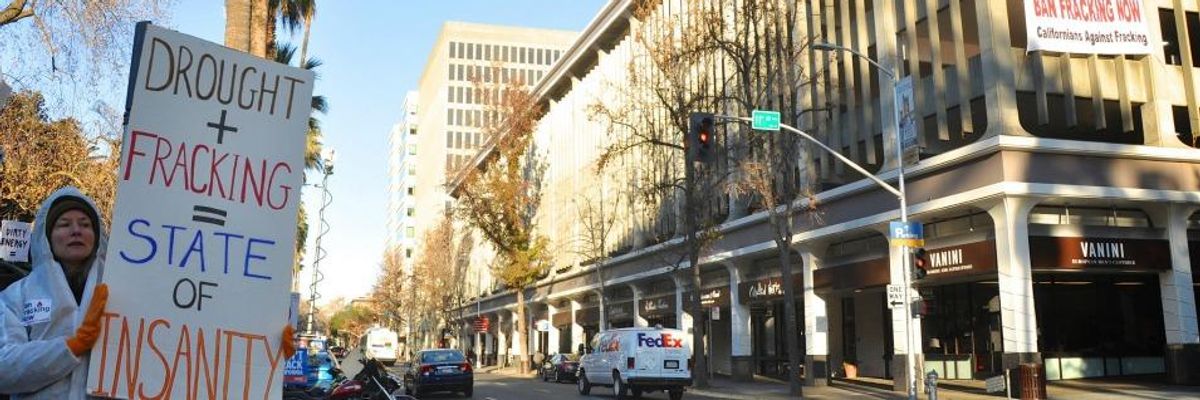As California Governor Jerry Brown this week instituted the state's first-ever mandatory restrictions on water usage to combat its historic four-year drought, environmental activists are pointing out two glaring exemptions from the order: the fossil fuel and agriculture industries.
Brown's mandate, announced Wednesday, directs cities and communities to cut down their water consumption by 25 percent, but does not make any requirements of the state's numerous oil companies, including those which practice the water-heavy fracking method of extraction, nor of large-scale farming operations.
"Both of them use tremendous amounts of water," Earthjustice attorney Trent Orr told Common Dreams.
Brown is "putting restrictions on everyone except oil and agriculture... it seems like the powerful industries have gotten a pass," Orr continued.
Adam Scow, California director of Food & Water Watch, also said Wednesday, "It is disappointing that Governor Brown's executive order to reduce California water use does not address the state's most egregious corporate water abuses. In the midst of a severe drought, the Governor continues to allow corporate farms and oil interests to deplete and pollute our precious groundwater resources that are crucial for saving water."
California's oil and gas industry uses more than 2 million gallons of fresh water a day to produce oil through fracking, acidizing, and steam injections, according to environmental estimates. In 2014, California oil producers used up nearly 70 million gallons of water on fracking alone, state officials toldReuters on Thursday.
While that number is lower than projected, fracking and toxic injection wells must not be given "a continuing license to break the law and poison our water," Zack Malitz, an organizer with environmental group Credo, told Reuters.
"Fracking and toxic injection wells may not be the largest uses of water in California," he added, "but they are undoubtedly some of the stupidest."
The bulk of Brown's mandate focuses on urban water use, which as the LA Timespoints out, makes up less than a quarter of the total water consumption in the state.
"The government's response to this growing crisis has been behind the curve," Jonas Minton, water policy adviser for the Planning and Conservation League and a former state water official, told the Times.
Rather than focusing on urban usage, Brown should go after the industries which contributed the most to the drought, environmental activists say.
Scow continued, "Governor Brown should stop... the ongoing contamination of groundwater aquifers by toxic wastewater from oil and gas operations. It is disturbing and irresponsible that the Brown administration continues to allow oil companies to contaminate and rob Californians of these fresh water sources."
According to Orr, the looming repercussions of the drought will be felt for years down the line and may emerge in yet-unknowable ways. In the Sacramento-San Joaquin River Delta, for instance, species of fish once abundant in the area are now nearly extinct, he said--a development which poses an ominous question: "What kind of natural systems will we have in California?"
"The environment desperately needs water," he added. "We're very disturbed at the unequal sharing of the burden... There's no principled reason for it."
As to why these industries found themselves exempt from facing the consequences of California's historic drought, Orr said, "The agriculture industry is tremendously powerful in California, and oil and gas are tremendously powerful period."

